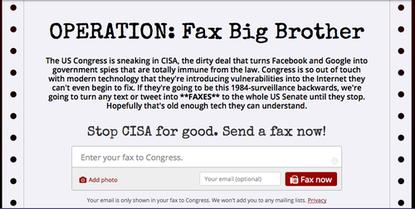Groups urge Obama to oppose cyberthreat sharing bills
- 29 July, 2015 02:12

Digital rights group Fight for the Future has launched an old-school fax campaign opposing CISA, a cyberthreat sharing bill.
U.S. President Barack Obama should oppose legislation intended to let businesses share cyberthreat information with each other and with government agencies because the bill would allow the sharing of too much personal information, a coalition of digital rights groups and security experts said.
The coalition of 39 digital rights and privacy groups and 29 security experts urged Obama to threaten to veto the Cybersecurity Information Sharing Act (CISA), a bill that may come to the Senate floor for a vote by early August. CISA would protect from customer lawsuits those businesses that share cyberthreat information.
"CISA fails to protect users' personal information," the coalition said in a letter to Obama, sent Monday. "It allows vast amounts of personal data to be shared with the government, even that which is not necessary to identify or respond to a cybersecurity threat."
The groups compared CISA to the controversial Cyber Intelligence Sharing and Protection Act (CISPA), a cyberthreat sharing bill that the House of Representatives approved in 2013. CISPA failed to become law after Obama threatened to veto it.
Backers of CISA and similar bills say the sharing of cyberthreat information is necessary for businesses and government agencies to respond to ongoing attacks.
"We cannot continue to have citizens' personal information needlessly exposed to foreign adversaries and criminals," Senator Richard Burr, a North Carolina Republican and main sponsor of CISA, said in June. "We can no longer simply watch Americans' personal information continue to be compromised."
A spokeswoman for Burr didn't immediately respond to a request for comment on the letter opposing CISA.
CISA has several problems, the groups said in their letter: It would allow government agencies to use information shared by businesses to investigate crimes unrelated to cyberattacks, and it allows the cyberthreat information to be shared with the National Security Agency and other surveillance agencies.
In addition, CISA would "undermine Internet security" by allowing businesses to deploy countermeasures during cyberattacks, even if those defensive actions would otherwise be illegal under the Computer Fraud and Abuse Act.
Among the groups signing the letter to Obama were the American Civil Liberties Union, the Center for Democracy and Technology, the Electronic Frontier Foundation and the New America Foundation's Open Technology Institute. Security experts signing the letter included Ronald Rivest, a computer science professor at the Massachusetts Institute of Technology; Bruce Schneier, a fellow at the Berkman Center for Internet and Society at Harvard University; and Dan Wallach, a computer science professor at Rice University.
Fight the Future, one of the groups signing the letter, has set up FaxBigBrother.com, encouraging U.S. residents to call or fax senators in opposition to the bill.
CISA is a "dirty deal that turns Facebook and Google into government spies that are totally immune from the law," the group said on the website.
"Congress is so out of touch with modern technology that they're introducing vulnerabilities into the Internet they can't even begin to fix," the group said. "If they're going to be this 1984-surveillance backwards, we're going to turn any text or tweet into faxes to the whole U.S. Senate until they stop. Hopefully that's old enough tech they can understand."
Grant Gross covers technology and telecom policy in the U.S. government for The IDG News Service. Follow Grant on Twitter at GrantGross. Grant's email address is grant_gross@idg.com.

